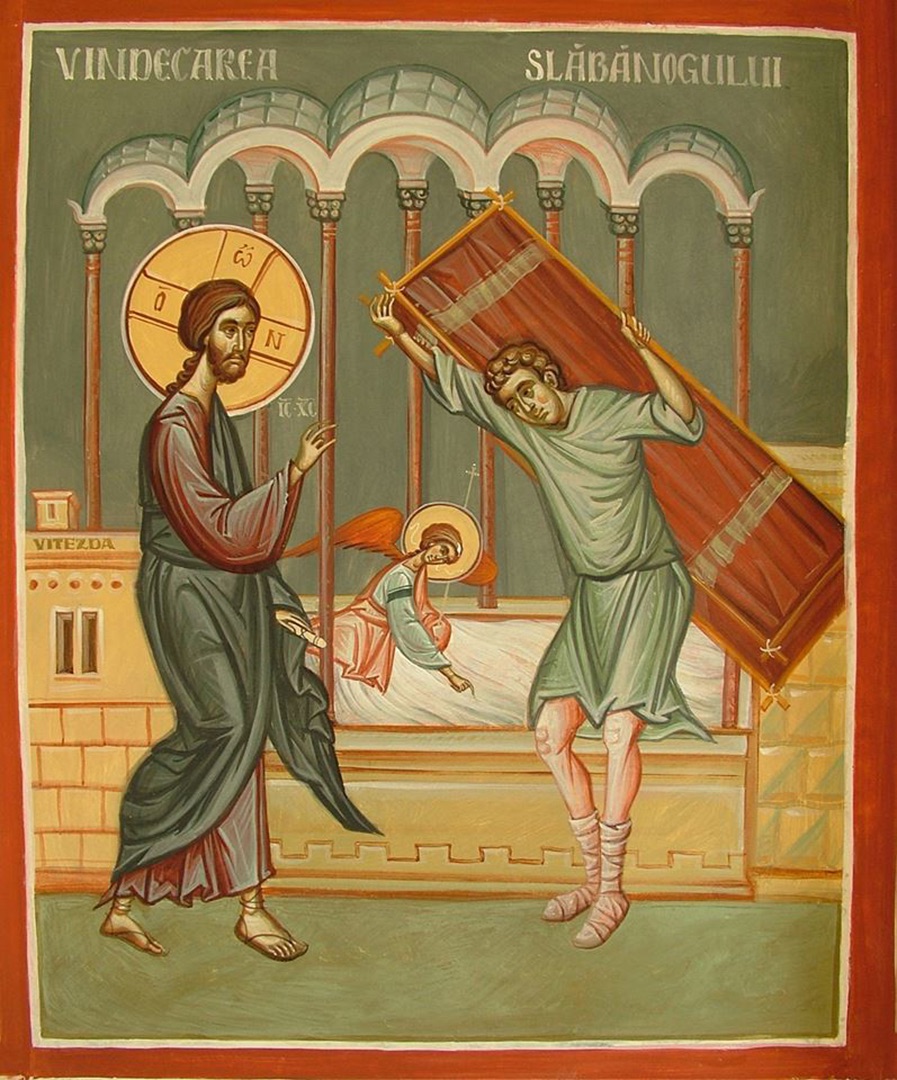Sermon for the 4th Sunday of Pascha

In the name of the Father, and of the Son, and of the Holy Spirit. Amen.
Beloved brothers and sisters in Christ,
Today, on the 4th Sunday of Pascha, we reflect upon the healing of the Paralytic at the Pool of Bethesda, as recounted in the Gospel of John (John 5:1-15). This miraculous event provides a profound lesson on the power of Christ’s compassion and the transformative power of faith.
The Pool of Bethesda, located near the Sheep Gate in Jerusalem, was believed to have healing properties. An angel would periodically stir the waters, and the first person to step into the pool afterwards would be healed of their ailment. Among the many sick and disabled gathered there, one man had been paralyzed for thirty-eight years. Despite his affliction, he had not lost hope, waiting patiently for his chance to be healed.
When Jesus saw the paralytic lying there and learned of his long suffering, He asked him, “Do you want to be made well?” This might seem like an obvious question, but it goes to the heart of our human condition. Sometimes, in our prolonged suffering or habitual sin, we can become resigned to our state, losing the will to seek change or healing. The paralytic’s response, “Sir, I have no one to put me into the pool when the water is stirred up; but while I am coming, another steps down before me,” reveals his deep desire for healing but also his helplessness and isolation.
Jesus, in His boundless mercy, does not merely provide the man with help to enter the water. Instead, He surpasses the expectations of a miraculous pool by offering immediate and complete healing. He says to the paralytic, “Rise, take up your bed and walk.” Instantly, the man is healed, takes up his bed, and walks. This command to “take up your bed” signifies a new beginning, a release from the old life of affliction and a step into a life renewed by the grace of God.
This miracle on the Sabbath prompted controversy among the Jewish leaders, who focused on the legalistic interpretation of the Sabbath laws rather than the miraculous sign of God’s love and power. Jesus’ act of healing on the Sabbath teaches us that God’s compassion and mercy transcend human rules and traditions. The true observance of the Sabbath, and indeed of all commandments, is found in love and mercy, reflecting the heart of God’s law.
The story of the Paralytic also encourages us to recognize our own spiritual paralysis. There are times when we might feel stuck in patterns of sin, doubt, or despair. Like the paralytic, we may find ourselves saying, “I have no one to help me,” feeling isolated and hopeless. Yet, Christ comes to each of us, offering healing and renewal. He asks us, “Do you want to be made well?” This question invites us to examine our willingness to be healed and to take up the challenge of living a new life in Christ.
In responding to Christ, we must show our faith through action. The paralytic’s obedience in taking up his bed and walking signifies our need to respond to God’s grace with active steps towards holiness. This may involve leaving behind old habits, seeking reconciliation with those we have wronged, and actively participating in the sacramental life of the Church.
As we continue our journey through the Paschal season, let us remember that the resurrection of Christ is not just a historical event, but a present reality that brings new life and hope to each of us. Christ’s victory over death and sin offers us the power to rise from our own paralysis, to walk in newness of life, and to bear witness to His love and mercy in the world.
May we, like the healed paralytic, rise from our afflictions, take up our beds, and walk in the light of Christ’s resurrection, sharing the good news of His transformative love with all we encounter.




